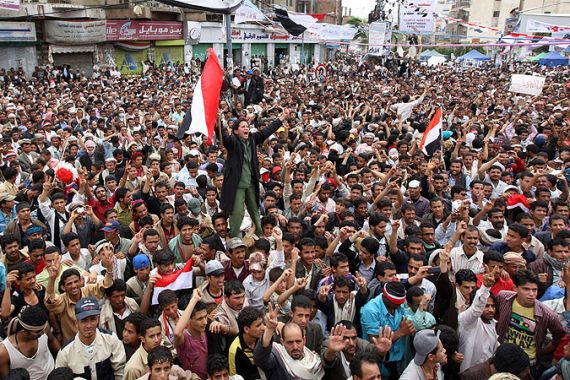Scores wounded in Yemen clashes
Rival groups clash in port city of Al-Hudayah amid continuing demonstrations against President Saleh.

 |
| The anti-government protests in Yemen are inspired by the recent uprisings in Tunisia and Egypt [REUTERS] |
At least 120 people have been wounded in renewed clashes between pro- and anti-government protesters in the Yemeni port city of Al-Hudayah.
Witnesses said police and government loyalists attacked anti-government protesters with tear gas, rocks and bullets on Wednesday. Ten protesters were shot, and dozens were stabbed and hit with rocks, a medical official told the Associated Press news agency.
“We received around 200 wounded, 10 were hit by gunfire and 40 suffered stab wounds. One died from his gunshot wounds after reaching the hospital,” a doctor told the Reuters news agency.
The violence comes as pro-democracy opposition groups and students escalate their campaign to remove Ali Abdullah Saleh, Yemen’s president for 32 years, from power.
A man who was wounded on Tuesday when police violently dispersed another protest in al-Hudayah died of his injuries on Wednesday, a medical official said.
Some 40 people dead have been killed since the protests, inspired by similar popular uprisings in the Arab world, began last month.
In the southern province of Taez, police fired tear gas on Wednesday to disperse a student demonstration, wounding eight female university students.
In the northeastern provincial capital of al-Jawf, meanwhile, three GPC loyalists were wounded in clashes with opposition supporters on the third straight day of attempts by both sides to gain control of government headquarters there, according to a local official.
A security official said an activist of the main Islamist opposition al-Islah party was shot dead in a gunfight with pro-Saleh activists in al-Jawf on Tuesday.
Despite a security clampdown, protests have been staged across the country almost daily.
Saleh has pledged to step down after his current term expires in 2013, but protesters want him to go without any further delay.
Saleh’s offer for a national unity government has also been rejected by the protesters as “too little, too late”.
Mohammed al-Sabri said on Wednesday that there would be “no chance of dialogue” with the president’s government in light of the violent crackdown. He said a European Union diplomat was attempting to mediate between the two sides, but that the outlook for those talks was not looking good.